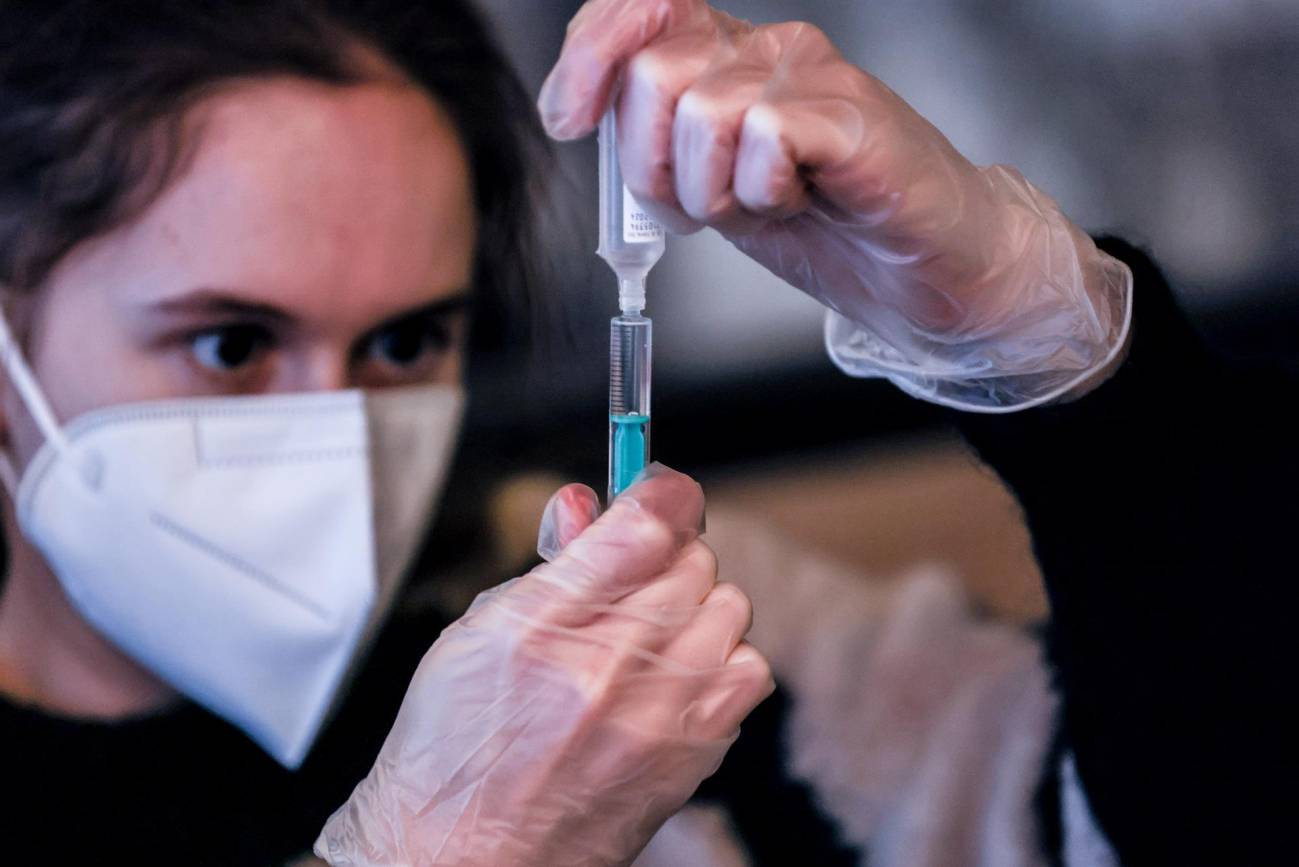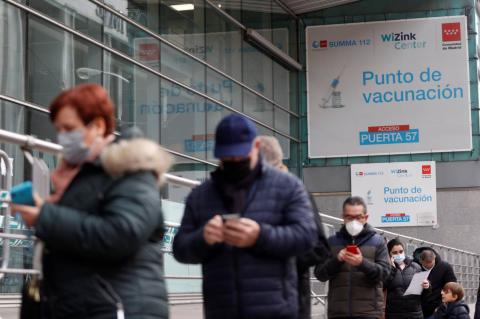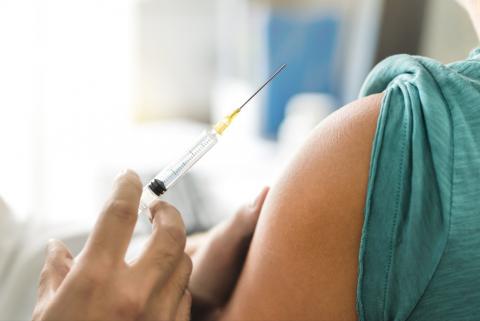Reactions to study claiming three doses of covid-19 vaccines protect better than two
To estimate the effectiveness of two or three doses of vaccines against covid-19 infection and hospitalisation, researchers in Denmark conducted a study of all previously uninfected Danish residents aged 12 years and older. The conclusion of the research, which is published in PLOS Medicine, is that a third dose provided greater protection against infection and hospitalisation with omicron than two vaccines.

Salvador Iborra - dosis
Salvador Iborra
Immunologist
To estimate the effectiveness of two or three doses of the Pfizer/BioNTech and Moderna vaccines, the study uses a nationwide Danish cohort, including a group of residents aged 12 years and older up to 59 years, and a group of residents aged 60 years and older with no history of SARS-CoV-2 infection (detected by qPCR or antigen test). The large number of people included in this study would therefore increase the quality and robustness of the results.
The study distinguishes periods in which the dominant variants were alpha, delta and omicron. The conclusions, in general, appear to be correct, but I believe that the data they provide do not allow us to clearly conclude that a third dose increases the effectiveness against hospitalisation in people over 60 years of age. In this group we can only compare the effectiveness of both doses against delta, as there is no data on protection against alpha in people with three doses, nor against omicron in people with two doses. The data on effectiveness against delta is 97.7% 61-90 days after the second dose, while in an equivalent period after three doses, the effectiveness is 91.7%. It is true that vaccine effectiveness against omicron in this group (three doses) declines slowly, but we do not know what would have happened with only two doses of vaccine.
The study indicates that effectiveness against delta infection declines over time in the two-dose group (there is insufficient data with three doses). In the omicron-dominated period, effectiveness against infection is generally low (50%), being virtually zero in the group vaccinated with two doses at 120 days, and maintained in the group that received a third dose (VE 50%).
Effectiveness against hospitalisation also declines with time after vaccine administration, but less markedly. The decline is most marked in the omicron-dominated period, interestingly, it is greatest in the youngest group (67.5% in the 12-59 group; 83.3% in those over 60). A third dose does not increase efficacy 120 days after the last dose, but may slow the initial 30-90 day drop in efficacy in those under 60.
Overall, the data are consistent with the low effectiveness of the vaccines against omicron infection (relative to the other subvariants), and that this effectiveness improves or declines less with additional doses.
The authors have considered several confounding factors: age, sex, comorbidity (diabetes, obesity, cancer, etc.), geographic location. Limitations are related to the possibility that, despite mass screening in Denmark, some infections may have been missed by antigen or PCR tests, or biases due to different individual behaviour (people who are monitored very frequently versus those who are not, people at higher risk of exposure to the virus). No distinction is made between asymptomatic and symptomatic infections. No distinction is made between different sub-variants of omicron. The number of unvaccinated people in the omicron period is very small, which may create biases.
This study confirms that, although current vaccines have a low effectiveness against omicron infection, they are relatively effective in preventing hospitalisation. In my opinion, the data from this study do not provide clear and evident support that a third dose improves the duration of effectiveness against hospital admission in people over 60 years of age, at least in the period covered by the study: 60-90 days after vaccination. This could have implications for decision-making regarding the administration of booster or additional doses.
Sonia Zúñiga - dosis
Sonia Zúñiga
Virologist at the National Biotechnology Centre (CNB-CSIC)
This work is in line with what had already been observed about the efficacy of vaccines, both in preventing hospitalisation and infection, depending on the doses, the time after the dose, and the variant of the virus.
It has the virtue of being a very large population-based study, across a whole country, which reinforces what was already known. As the authors themselves say, one limitation of the study is that, due to the timing, the results obtained against omicron may change if the new BA.4 and BA.5 variants are taken into account. It would be desirable for the study to be continued throughout 2022, in order to be able to evaluate this aspect. This would also extend the post-vaccination or post-reboot time in which efficacy against Omicron is assessed in a similar way to what has been done with other variants.
López Hoyos - dosis
Marcos López Hoyos
Scientific Director of the Valdecilla Health Research Institute (IDIVAL), Head of the Immunology Department, and Professor of Immunology at the University of Cantabria-Marqués de Valdecilla University Hospital
This is the analysis of the Danish registry, which is well collected with mRNA vaccinations (Pfizer and Moderna) and shows good vaccine protection against infection with the alpha and delta variants, dropping significantly with the omicron.
A strength of the study in Denmark was the high access to testing for covid-19 since the beginning of the pandemic. This is in line with other registries and papers.
Protection against hospitalisation from delta and omicron was very high.
It is a study that confirms everything described to date in other series and registries. As the authors say, the major limitation of the study is the non-randomisation of the groups, since at certain ages the vaccination rate was almost 100% and the unvaccinated reference group was not comparable.
They also include the effect of comorbidities as covariates, although they only use the sum of one to four comorbidities considered, without differentiating the differential effect.
Ignacio Molina - dosis
Ignacio J. Molina Pineda
Professor of Immunology and Director of the Department of Biochemistry and Molecular Biology 3 and Immunology at the University of Granada
The study by Gram et al. clearly demonstrates that a third dose of vaccine is necessary to obtain durable protection against SARS-CoV-2. The main strength of the study is the large sample size, as it was conducted in the Danish population.
However, it does not add anything new to our knowledge. It has been quite clear for quite some time already from several previous studies that, while two doses provided good protection against the pre-omicron variants, this was not the case against omicron. Omicron is quite different from the original strain, which is the immunogen contained in the current vaccines, so three doses are necessary for the whole population, as omicron is the hegemonic variant at present. The most recent studies are already evaluating the effectiveness of four doses.
- Research article
- Peer reviewed
- Observational study
- People



